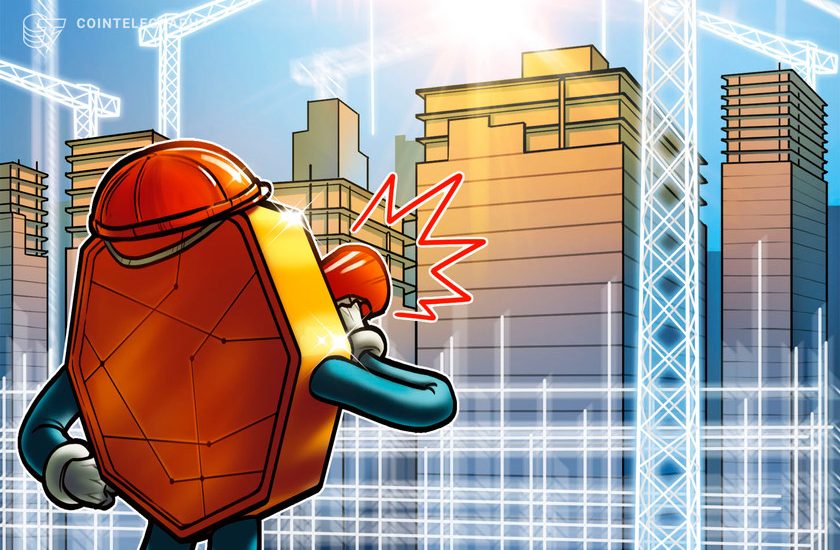- March 22, 2023
- Posted by: admin
- Category: BitCoin, Blockchain, Cryptocurrency, Investments


Circle’s chief strategy officer Dante Disparte said at a Paris Blockchain Week panel that while the chain is currently not strong, people are continuing to build and develop.
A panel filled with professionals working in prominent tech companies discussed the current state of the blockchain space at the ongoing Paris Blockchain Week 2023 conference.
Cointelegraph’s editor-in-chief Kristina Lucrezia Cornèr moderated the panel discussion titled “State of the Chain 2023” with panelists Ryan Nitz, the head of solutions architecture at Coinbase; Matthew Savarese, the head of strategy at Nasdaq Digital Assets; Rich Widmann, the head of strategy for Web3 at Google; Dante Disparte, the chief strategy officer and head of global policy at Circle; and Denelle Dixon, the CEO of Stellar Development Foundation.
The panelists discussed various topics and gave their insights on the current state of the Web3 space, from sharing their company’s current focus to giving their predictions on how 2023 would continue.
One of the topics explored in the discussion is the challenges that the industry faced in 2022 up to today. Commenting on the topic, Disparte expressed his belief that the current state of the chain is “not strong.” Despite this, the Circle executive is hopeful that people continue building and developing amid these challenges, which is evident in the thousands of attendees at the PBW conference.
Live from the State of the Chain 2023 panel at @ParisBlockWeek : @RichJWidmann, Global Head of Web3 Strategy at @googlecloud, emphasizes the importance of building value for users in the next evolution of the internet. #PBW2023 pic.twitter.com/8x1hAgJTZG
— Cointelegraph (@Cointelegraph) March 22, 2023
In addition, Disparte also believes that the current situation in the space is a necessary phase similar to past tech and financial industry failures. He explained that:
“You needed the dotcom bubble to burst to hand over the development of the internet toward normal people, business models and investors. You needed the 2008 financial crisis to get comprehensive reforms of Wall Street even if those reforms might have failed.”
The executive also reminded the audience that many things that are being “taken for granted” in the space are born in response to the failures of the traditional financial systems.
Meanwhile, other panelists gave the audience a preview of what their firms are currently putting their focus on. According to Nitz, crypto exchange Coinbase is currently trying its best to help onboard Web2 companies and eliminate the barrier of complexity. He explained that:
“We’re starting to see Web2 brands evolve and start getting involved in the Web3 and crypto ecosystem. One of the challenges they are facing is a great deal of complexity. This is why at Coinbase, we are trying to simplify this experience.”
On the other hand, Widmann pointed out that while there is indeed a need to reach more users for Web3, the Google executive also highlighted that there is something of value within the space. “Yes, we need to have a billion users. Yes, we need more people using these technologies. But before we do that, we actually have to prove that there’s value there,” he argued. He added:
“They’re not just going to show up because they care about Web3, they’re not just going to show up because we asked them to, we actually have to give them something that will motivate them to move with their feet.”
In addition, Widmann shared that Google’s current focus is thinking of how to remove barriers of entry for new developers who may be leaving Web2 projects like Google and go to Web3 firms like Coinbase and build the next applications that will attract billions of users.
Related: EU MiCA crypto regulation is a ‘balancing act’: Paris Blockchain Week 2023
Contributing to the discussion, Savarese shared NASDAQ’s perspective. According to Savarese, the stock exchange company believes that institutions being involved in the Web3 ecosystem are just as important as everything else. Savarese explained:
“Where we see the opportunity is bringing a lot of those, whether they be in large pension funds, whether it be large asset managers, understanding everything from the KYC elements to it down into how does it transact.”
While many of the panelists focused on the present and gave their thoughts about the current state of the blockchain space, Dixon made some predictions about the future. According to the Stellar Development Foundation CEO, 2023 is going to be amazing and challenging.
“I get it. Like, we’re in this spot where we have lots of regulators looking at us and saying things but we can convince them otherwise when we focus on what we’re really good at,” she added.
